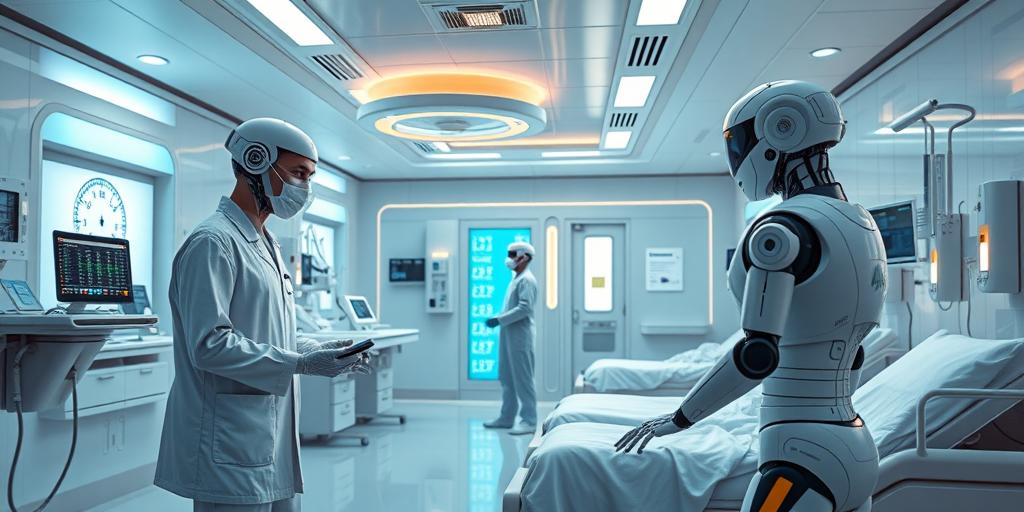The way we approach healthcare is on the cusp of a dramatic transformation, driven by the rapid advancements in technology. Healthcare technology is no longer just about medical devices and procedures; it’s about harnessing the power of data, artificial intelligence, and interconnected systems to improve patient care, outcomes, and overall well-being.
The Future of Healthcare: A Technological Revolution
Introduction: The Dawn of a New Era
Healthcare is at a pivotal point, poised for a revolution driven by emerging technologies. The convergence of data science, artificial intelligence, and innovative medical devices is ushering in a new era of personalized medicine, improved diagnostics, and more effective treatments. This revolution promises to not only enhance patient outcomes but also make healthcare more accessible and affordable.
The Power of Data and Analytics
Data is the new currency in healthcare, and its potential is immense.
Precision Medicine: Tailoring Treatments to Individuals
The era of one-size-fits-all treatments is fading. Precision medicine leverages data and analytics to understand a patient’s unique genetic makeup, lifestyle, and environmental factors to tailor treatment plans. This personalized approach allows for more effective therapies and potentially reduces adverse reactions.
Predictive Analytics: Identifying Health Risks Early
By analyzing large datasets, predictive analytics can identify individuals at risk of developing certain diseases. This early detection enables proactive interventions and potentially prevents the onset or progression of chronic conditions.
Artificial Intelligence (AI) in Healthcare
AI is rapidly changing the landscape of healthcare, automating tasks, enhancing decision-making, and improving patient care.
AI-Powered Diagnosis and Treatment
AI algorithms are being trained to analyze medical images, lab results, and patient data to assist in diagnosing diseases with greater accuracy and speed. This can lead to earlier detection, more targeted treatments, and better patient outcomes.
Robotic Surgery: Enhancing Precision and Minimizing Risks
Robotic surgery systems are becoming increasingly sophisticated, allowing surgeons to perform complex procedures with greater precision and minimal invasiveness. This translates to faster recovery times, reduced pain, and less risk of complications.
The Rise of Telemedicine
Telemedicine is bridging the gap in healthcare access, connecting patients with healthcare professionals remotely.
Remote Consultations: Bridging the Gap in Access
Telemedicine allows patients in remote areas or those with limited mobility to consult with specialists without traveling long distances. This improves access to care and reduces healthcare disparities.
Virtual Monitoring: Empowering Patients to Take Control
Wearable devices and remote monitoring systems allow healthcare providers to track patient vitals and progress in real-time, enabling early intervention and personalized care. This empowers patients to actively participate in their health management.
Wearable Technology and Health Monitoring
Wearable devices are revolutionizing how we monitor our health and well-being.
Real-Time Data Collection: Tracking Vital Signs and Activity
Smartwatches, fitness trackers, and other wearable devices continuously collect data on heart rate, sleep patterns, activity levels, and other vital signs. This real-time data provides insights into an individual’s health and helps identify potential issues early on.
Personalized Health Insights: Empowering Individuals to Make Informed Decisions
By analyzing collected data, wearable devices can offer personalized insights and recommendations to improve health habits, manage chronic conditions, and prevent future health problems.
Challenges and Opportunities
While the promise of healthcare technology is immense, there are challenges that need to be addressed to ensure ethical and equitable access to these advancements.
Ethical Considerations: Balancing Innovation with Privacy
The use of AI and data analytics raises ethical concerns regarding patient privacy, data security, and the potential for biased algorithms. It’s crucial to ensure that healthcare technology is developed and used responsibly, protecting sensitive patient information.
Data Security and Privacy: Protecting Sensitive Information
Healthcare data is highly sensitive, and its security is paramount. Robust cybersecurity measures are needed to protect patient information from breaches and ensure data privacy.
Accessibility and Equity: Ensuring Technology Benefits All
It’s essential to ensure that emerging technologies are accessible to all individuals, regardless of socioeconomic status, geographic location, or health literacy. Bridging the digital divide and providing adequate training and support are crucial to maximizing the benefits of healthcare technology.
Regulation and Policy: Adapting to Rapid Technological Advancements
The rapid pace of technological advancements requires a dynamic regulatory framework. Governments and regulatory bodies need to adapt to emerging technologies and ensure they are safe, effective, and ethically used.
Embracing the Future of Healthcare
Emerging technologies have the potential to transform healthcare into a more personalized, proactive, and patient-centered system. By embracing innovation, fostering collaboration between healthcare providers, technology developers, and researchers, we can unlock the full potential of these advancements and create a healthier future for all.
The journey towards a more technologically advanced healthcare system is one that requires careful consideration of ethical and practical concerns. But by embracing collaboration and innovation, we can harness the power of healthcare technology to improve patient outcomes, reduce healthcare costs, and create a more equitable and accessible healthcare system for everyone.




